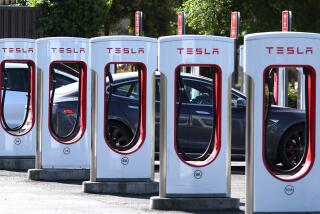In Denver, when bad driving habits hit the wallet
- Share via
DENVER — The results of a novel experiment are in: A lead foot and lazy driving habits not only waste gas, they’re bad for the environment.
For nearly a year, every time a group of Denver drivers stomped on the gas pedal, slammed on the brake or spent an extra minute idling at the curb, the actions were recorded by a device called an accelerometer and assessed for effects on gas consumption.
The drivers -- half of them city employees and half residents who volunteered for the constant surveillance -- were subjects in a city experiment to see whether motorists would drop aggressive driving habits when they saw how much gasoline they were burning.
Apparently, they will.
Over seven months, the 400 drivers cut their tailgating, hard braking and speeding -- and improved their gas mileage by 10%, according to results released last week.
“If people can see a problem, and understand how to fix it, they will fix it,” said Larry Goldenhersh, president of Carlsbad, Calif.-based Enviance Inc., which developed the software for the program.
The pilot program, sponsored by an oil and gas company, aimed to quantify the connection between bad driving and gas emissions. Denver was the first test site, but other cities and private companies intend to try the program, Goldenhersh said.
The accelerometers record the number of moves a driver makes that decrease fuel efficiency by 20%, Goldenhersh said. Participants can then track how they are doing via a website that stores the data.
Initially, the average amount of carbon dioxide emitted per vehicle was 647 pounds per month. By the end of the test phase, that number dropped to 545 -- amounting to a monthly reduction of 40,800 pounds of carbon dioxide for all 400 cars.
Denver city workers driving municipal vehicles made the biggest gains, cutting their idling time by 40%. Such results, if expanded to entire fleets, could save the city hundreds of thousands of dollars in fuel costs every year, Goldenhersh said.
Still, the overall improvements weren’t as high as officials had hoped.
Denver Mayor John Hickenlooper said he wanted to see gas mileage improve by 15%.
“It’s not quite what we wanted,” said Hickenlooper, who aims to examine the results more closely to determine whether to expand the program.
The experiment succeeded at least in making motorists more attuned to their practices. That includes the two staff members who chauffeur the mayor around town, Hickenlooper said.
“Our fast starts and hard braking were virtually eliminated in the last six months,” he said. “This is about driver education and self-awareness -- to make people more thoughtful.”
Juan Marsh, a field supervisor with Denver’s parks and recreation department, said he was surprised to learn about his driving habits -- for example, how often he left his engine running while he visited a job site and spoke to a crew.
“It was just a habit,” Marsh said.
The feedback from his accelerometer “instantly made me conscious of those issues,” he said. “I just flat-out didn’t realize I was wasting fuel that way.”
As Denver deals with a budget crisis and employees face the prospect of mandatory furloughs, Marsh said, “it’s even more of an incentive to save fuel. When it hits me in my pocketbook, that’s an incentive to help the city.”
More to Read
Sign up for Essential California
The most important California stories and recommendations in your inbox every morning.
You may occasionally receive promotional content from the Los Angeles Times.











